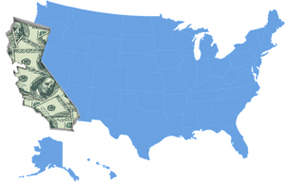
As inflation and high demand push home prices higher all across the country, voters in other states are adopting tax-limitation laws to deal with skyrocketing property taxes.
Californians are protected by Prop. 13 from having to pay annual property tax bills based on current market value. Under Prop. 13, the historic initiative championed by Howard Jarvis in 1978, the taxable value of property can rise no more than 2% per year until there is a change of ownership, and the tax rate is capped at 1%. Before Prop. 13, there was no cap on the assessment or the tax rate, which averaged 2.67% statewide.
Homeowners who could not afford to pay 2–3% of the market value of their home every year in property taxes were forced to sell, even if the mortgage was paid off and the home was owned free and clear.
Today that’s happening in other states, and angry voters are changing their laws to give property owners more protection from being taxed out of their homes.
In the November election, Florida voters passed an initiative that adjusts the “homestead” property tax exemption to keep pace with inflation.
Property tax exemptions were expanded for veterans and their families in New Mexico, Virginia and Colorado.
Georgia voters approved a cap on annual increases in assessed value tied to the rate of inflation. Wyoming voters approved a constitutional amendment that allows homes to be taxed at a lower tax rate than other types of property.
In Arizona, voters approved a measure that allows the owners of homes or business properties to apply for property tax refunds if local governments fail to enforce nuisance laws. The proposal came from the conservative Goldwater Institute in response to complaints that homeless encampments were endangering the community and damaging property.
When taxation gets out of control and elected officials won’t take action, the result can be a tax revolt. California led the nation with Proposition 13, and Californians are more secure in their homes because of it.

